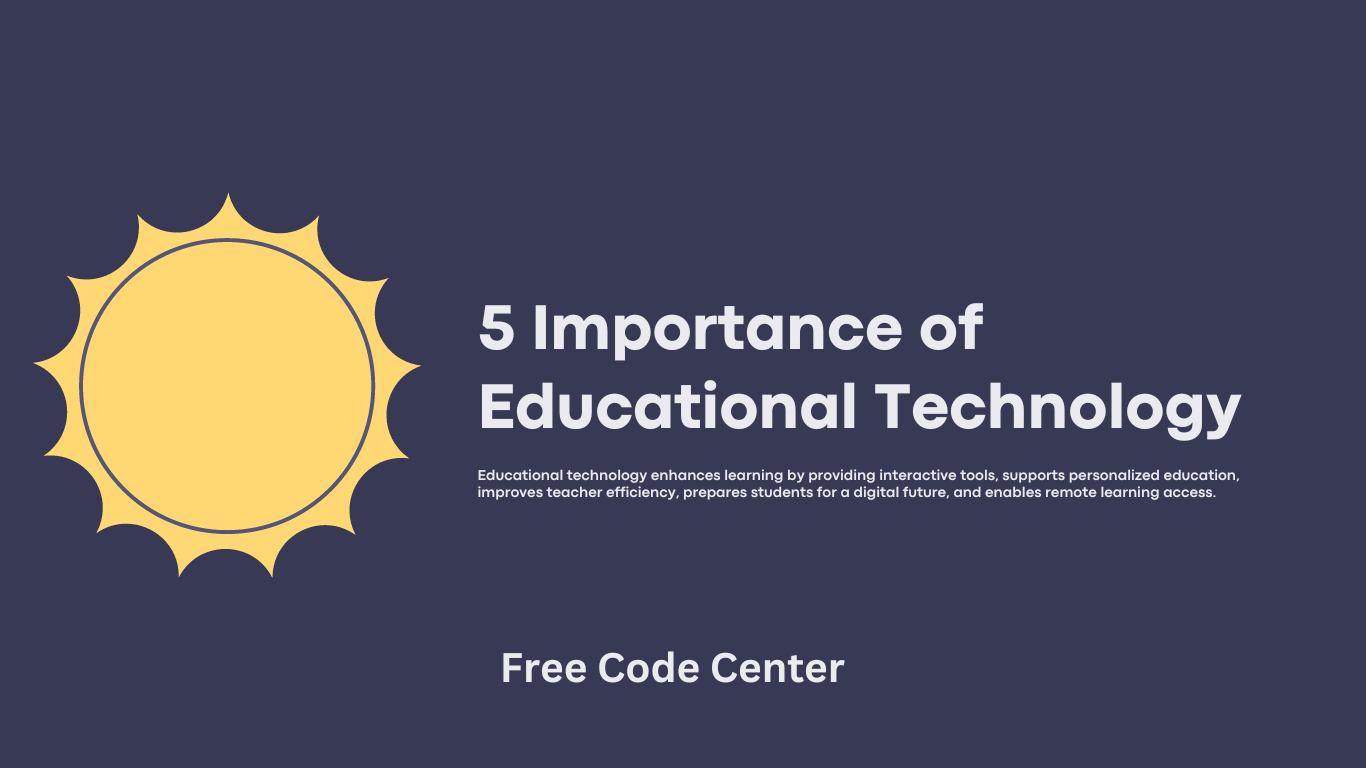Importance of Educational technology for the teacher and student
Introduction
With the rise of technology, the educational industry has embraced these advancements to achieve better learning outcomes. It’s amazing how much teaching tools have evolved — gone are the days when the classroom was limited to chalkboards and textbooks. These days, with just a few clicks, students can access a wealth of information, connect with others across the globe, and learn at their own pace. I remember when I first used an online learning platform for a course—being able to interact with students worldwide and discuss ideas freely was a game-changer. But why is educational technology so important today? Let me share with you five reasons why it’s become a necessity in our learning journey.
Provides Better Opportunities When Learning
Most of the benefits that are obtained from the use of technologies in education technologies revolve around the improvement of how and what the learners gain from various situations.

a. Active Participation of Students in class
It is hard to picture a dull classroom full of students with their books and notes without any burning lecture. The introduction of educational technology helps to shift from such a boring way of study to a more engaging one, which increases the enjoyment of such difficult subjects.
b. E-learning
There is no way that students will only be focused on the hard textbook in order to source the information. They can use educational technology and be able to go through resources like videos, podcasts, and articles, and even simulate some of those things using educational virtual reality.
Makes Learning More Personal
One factor that should be very clear to anybody engaged in instructional activities is that each and every learner is unique and has a different potential and rate of understanding new concepts.
a. Learning Paths ramping up the competencies of learners
Educational technology enables teachers to design parallel pathways for their students depending on the individual’s requirements and capacity. This means that if you are not so good in math but are a pro in science, the approach employed at the institution will take such an approximation!
b. Learner-centric adaptive technology
Thanks to adaptive learning software, learners are able to enjoy structures that provide varied learning experiences with feedback appropriate to the present time resources for learning are implemented based on their progress.
Equipped Students for Tomorrow
The ability to tackle the challenges of the 21st century, which is fast becoming digital, is very important in educating learners.
a. Exposure to low-level educational technology for incorporation
Educational technology extends well beyond the classrooms and affords learners with various competencies that are important in the present world of employment. These include motivation through online engaging use of rational work that employers cannot overlook.
b. Employ-ability skills
A lot of organizations today consider candidates who are: versed with modern technology and are able to cope with the changes in the amended technologies. Integration of educational technologies into curriculum content has become an important step in advancing these skills to the learners.
Makes Communication and Collaboration Indispensable
Learning is solitary but it need not be so as such conducts are more often inevitable and by far inefficient.
a. Virtual Learning Platforms
Various platforms including Google Classroom, Zoom, or Slack enable students meeting at one physical location, and far apart, to complete their tasks in groups. This encourages collaboration and improves communication skills which are important for jobs nowadays.
b. Cross-Cultural Learning.
Using educational technology helps students working in various parts of the world to avoid geographical separation. This interfacing helps in widening one’s horizons and developing a sense of belonging to the world.
Enhances Motivation and involvement >> 5 importance of science and technology in education
Let’s accept it: the lessons that are delivered are not always interesting.
a. Game Aspects in Education
It makes education so much more interesting by adding game elements such as achievements and competition elements including levels and points. Students have higher cognitive engagement and attention when they earn points or achievement badges.
b. Its Importance in Real Life
Engaging in such activities helps students to learn the subjects better since they get to practice what they learn in class. Students are more interactive through virtual labs or project-based assignments because they understand the relevance of their studies to the outside world and life.
Conclusion
Educational technology can never be described as simply a passing fad. It denotes a more profound change in our practices regarding both the act of teaching and the process of learning. Education as we know it is reshaped for the better in many ways, including improving experience, customization, addressing the challenges of the day, facilitating cooperation, and increasing participation.
It is clear that by embracing these technologies, more sophisticated and effective generations will be produced and they are not simply going to compete in examinations, they are going to be able to survive in this very dynamic society and thrive.
FAQs About Educational Technology
Educational technology constitutes any hardware or software application that enhances the overall learning experience in a classroom setting.
It brings forth elements that are interactive such as the use of games, and the practical side of theories to increase relevance to students.
Yes! It enables teachers to adapt lessons according to each student’s learning as well as achievement using different levels of their learning progress.
Students and learners acquire digital skills in the appropriate and accurate use of digital technologies as well as solving real-world problems that require creative and critical thinking, communication, and working with others.
Is educational technology suitable for all age groups?
Yes! Although they vary in design, educational technologies can be utilized by all ages and learning capabilities making them effective at different levels of education.





